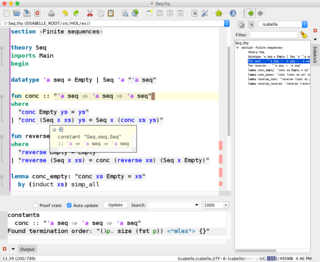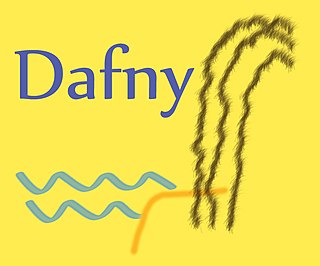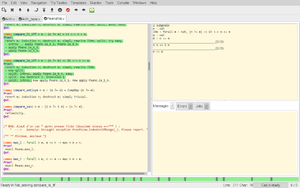OCaml is a general-purpose, high-level, multi-paradigm programming language which extends the Caml dialect of ML with object-oriented features. OCaml was created in 1996 by Xavier Leroy, Jérôme Vouillon, Damien Doligez, Didier Rémy, Ascánder Suárez, and others.

A mathematical proof is a deductive argument for a mathematical statement, showing that the stated assumptions logically guarantee the conclusion. The argument may use other previously established statements, such as theorems; but every proof can, in principle, be constructed using only certain basic or original assumptions known as axioms, along with the accepted rules of inference. Proofs are examples of exhaustive deductive reasoning which establish logical certainty, to be distinguished from empirical arguments or non-exhaustive inductive reasoning which establish "reasonable expectation". Presenting many cases in which the statement holds is not enough for a proof, which must demonstrate that the statement is true in all possible cases. A proposition that has not been proved but is believed to be true is known as a conjecture, or a hypothesis if frequently used as an assumption for further mathematical work.

The Isabelle automated theorem prover is a higher-order logic (HOL) theorem prover, written in Standard ML and Scala. As a Logic for Computable Functions (LCF) style theorem prover, it is based on a small logical core (kernel) to increase the trustworthiness of proofs without requiring, yet supporting, explicit proof objects.
In mathematical logic and computer science, the calculus of constructions (CoC) is a type theory created by Thierry Coquand. It can serve as both a typed programming language and as constructive foundation for mathematics. For this second reason, the CoC and its variants have been the basis for Coq and other proof assistants.

In computer science and mathematical logic, a proof assistant or interactive theorem prover is a software tool to assist with the development of formal proofs by human–machine collaboration. This involves some sort of interactive proof editor, or other interface, with which a human can guide the search for proofs, the details of which are stored in, and some steps provided by, a computer.
In computer science and logic, a dependent type is a type whose definition depends on a value. It is an overlapping feature of type theory and type systems. In intuitionistic type theory, dependent types are used to encode logic's quantifiers like "for all" and "there exists". In functional programming languages like Agda, ATS, Coq, F*, Epigram, Idris, and Lean, dependent types help reduce bugs by enabling the programmer to assign types that further restrain the set of possible implementations.
In computer science, in particular in knowledge representation and reasoning and metalogic, the area of automated reasoning is dedicated to understanding different aspects of reasoning. The study of automated reasoning helps produce computer programs that allow computers to reason completely, or nearly completely, automatically. Although automated reasoning is considered a sub-field of artificial intelligence, it also has connections with theoretical computer science and philosophy.

Damien Doligez is a French academic and programmer. He is best known for his role as a developer of the OCaml system, especially its garbage collector. He is a research scientist at the French government research institution INRIA.

Agda is a dependently typed functional programming language originally developed by Ulf Norell at Chalmers University of Technology with implementation described in his PhD thesis. The original Agda system was developed at Chalmers by Catarina Coquand in 1999. The current version, originally named Agda 2, is a full rewrite, which should be considered a new language that shares a name and tradition.

Matita is an experimental proof assistant under development at the Computer Science Department of the University of Bologna. It is a tool aiding the development of formal proofs by man–machine collaboration, providing a programming environment where formal specifications, executable algorithms and automatically verifiable correctness certificates naturally coexist.
Nqthm is a theorem prover sometimes referred to as the Boyer–Moore theorem prover. It was a precursor to ACL2.
Gérard Pierre Huet is a French computer scientist, linguist and mathematician. He is senior research director at INRIA and mostly known for his major and seminal contributions to type theory, programming language theory and to the theory of computation.

Thierry Coquand is a French computer scientist and mathematician who is currently a professor of computer science at the University of Gothenburg, having previously worked at INRIA. He is known for his work in constructive mathematics, especially the calculus of constructions.

In mathematical logic and computer science, homotopy type theory (HoTT) refers to various lines of development of intuitionistic type theory, based on the interpretation of types as objects to which the intuition of (abstract) homotopy theory applies.
Idris is a purely-functional programming language with dependent types, optional lazy evaluation, and features such as a totality checker. Idris may be used as a proof assistant, but is designed to be a general-purpose programming language similar to Haskell.
Univalent foundations are an approach to the foundations of mathematics in which mathematical structures are built out of objects called types. Types in univalent foundations do not correspond exactly to anything in set-theoretic foundations, but they may be thought of as spaces, with equal types corresponding to homotopy equivalent spaces and with equal elements of a type corresponding to points of a space connected by a path. Univalent foundations are inspired both by the old Platonic ideas of Hermann Grassmann and Georg Cantor and by "categorical" mathematics in the style of Alexander Grothendieck. Univalent foundations depart from the use of classical predicate logic as the underlying formal deduction system, replacing it, at the moment, with a version of Martin-Löf type theory. The development of univalent foundations is closely related to the development of homotopy type theory.

Dafny is an imperative and functional compiled language that compiles to other programming languages, such as C#, Java, JavaScript, Go and Python. It supports formal specification through preconditions, postconditions, loop invariants, loop variants, termination specifications and read/write framing specifications. The language combines ideas from the functional and imperative paradigms; it includes support for object-oriented programming. Features include generic classes, dynamic allocation, inductive datatypes and a variation of separation logic known as implicit dynamic frames for reasoning about side effects. Dafny was created by Rustan Leino at Microsoft Research after his previous work on developing ESC/Modula-3, ESC/Java, and Spec#.
Christine Paulin-Mohring is a mathematical logician and computer scientist, and Professor Faculté des Sciences at Paris-Saclay University, best known for developing the interactive theorem prover Coq.
Lean is a proof assistant and a functional programming language. It is based on the calculus of constructions with inductive types. It is an open-source project hosted on GitHub. It was developed primarily by Leonardo de Moura while employed by Microsoft Research and now Amazon Web Services, and has had significant contributions from other coauthors and collaborators during its history. Development is currently supported by the non-profit Lean Focused Research Organization (FRO).










